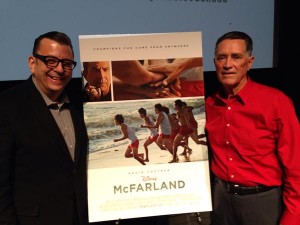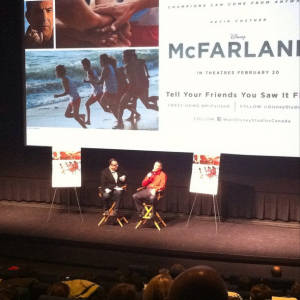Chatting with the real-life inspiration behind Kevin Costner’s McFarland
 By Richard Crouse – Metro In Focus
By Richard Crouse – Metro In Focus
Jim and Cheryl White have seen the movie McFarland three times and teared up every at every viewing, even though, he says, “we knew what was going to happen.”
The film, which stars Kevin Costner as the most successful Californian high school cross-country coach in history, is the story of White, his wife and their life and work in McFarland, California, an impoverished town transformed by sports.
The Texas native taught in McFarland for forty years, establishing a cross-country running team that would win nine state championships and give the runners a glimpse of life outside their small town and nearby fields where many of them worked as migrant “pickers.”
His success may have earned him a Hollywood biopic and a more permanent tribute in the form of a dedicated gazebo in the town square but he sees his influence in more metaphysical terms.
“To me my legacy is in the hearts and minds of these boys I’ve taught.”
In person White is a humble man who quietly commands respect. At a post screening Q&A I hosted with him in Toronto he earned a standing ovation before even saying a word. As the audience clapped he was genuinely moved, and with a quivering voice whispered to me to, “take over for a second.”
Earlier in the day we discussed seeing his life played out on the big screen. “We just hoped they could portray our true feelings of love for the town; for the community. That came across real well. We also felt like they portrayed the true hardships these boys went through.”
Hollywood did make some changes to White’s story and one scene in particular irked him. When we first see White in the film he’s hurling a cleated shoe at the lippy captain of his Idaho school football team, opening the kid’s cheek.
 “That is dramatic licence,” he says. “It bothered me for a while but I talked to Kevin Costner about it. I said, ‘Kevin, can you give me your true feelings about the situation that happened in Idaho?’ He said, ‘I think, Jim, you’re going to come across as the hero and not the villain because you’re standing up for what’s right.’ I said, ‘All right and I was satisfied with that.’”
“That is dramatic licence,” he says. “It bothered me for a while but I talked to Kevin Costner about it. I said, ‘Kevin, can you give me your true feelings about the situation that happened in Idaho?’ He said, ‘I think, Jim, you’re going to come across as the hero and not the villain because you’re standing up for what’s right.’ I said, ‘All right and I was satisfied with that.’”
White often uses the phrase “well, that’s Hollywood for you,” when describing the making of the film and the liberties taken with his life’s story but now that the movie is finished he says, “What was really fascinating to both us was watching the screen and seeing them say, ‘Mr. White would you come in here…’ Jim White this, and Cheryl White that. We’re sitting there looking at ourselves up there. It was kind of funny.”
